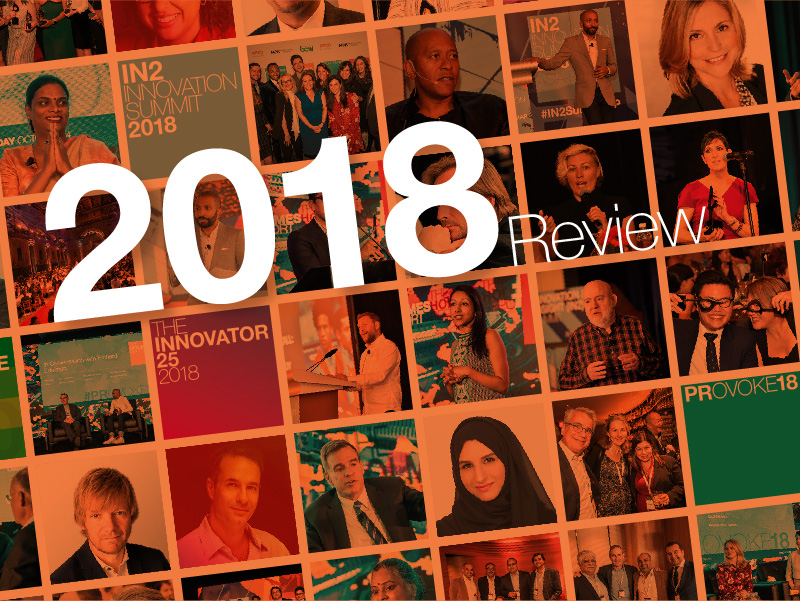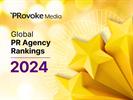Paul Holmes 07 Dec 2018 // 2:00PM GMT

Every year, The Holmes Report hosts numerous events, from our PRovoke Global Public Relations Summit in the US to regional IN2Summit events, and attends many more, including the annual business gatherings in Cannes and Davos. We report on dozens of the best sessions from these events. This roundup features 12 of the best from the past 12 months:
1. "Journalism under attack"
The timing could not have been better (or worse, perhaps): Washington Post executive editor Marty Baron and publisher Frederick Ryan appeared at our PRovoke18 conference in Washington, DC, as news of the murder of one of their contributors by Saudi Arabian agents continued to unfold, and as media outlets were among those receiving letter bombs from a deranged Trump supporter.
"What’s distinct is that journalists within the United States are being threatened in a way we have never seen before,” Baron told the audience. “We have had to increase security not only for our newsroom but across the organization… We have an environment of hostility in this country that has gotten worse in the current political situation, and it’s motivating some people to take these actions.”
2. Parkland survivors at Cannes
Amid all the celebrities (Queen Latifah, Thandie Newton) and marketing luminaries (Marc Pritchard, Keith Weed), a trio of speakers stood out: three survivors of the Parkland school shooting in America, who with their peers have turned a tragedy into a new political movement, defying cynics and rewriting the rules of activism.
The survivors told attendees how their movement drove the kind of change that has long eluded gun control activists — stricter state gun laws and major corporations cutting ties with the NRA — garnering large-scale support largely by tapping the social media prowess that is, more or less, innate to today’s teens. Within six weeks, the March for Our Lives in Washington they organized drew hundreds of thousands, and spurred student protests around the country.
3. The return of Martin Sorrell
Sir Martin Sorrell’s second appearance at the PRovoke Media conference — and his first since departing WPP and launching his new S4 Capital business — was a feisty affair, as he made it obvious that he would have done a far better job in coming up with the right questions had he been allowed to interview himself.
Nevertheless, there were some tasty nuggets. His former company “seems to be a car crash in slow motion,” rival Omnicom “has no strategy,” and PR has benefited from being “faster, better, cheaper” (or at least faster and cheaper). Oh, and he is not a bully: "By that do you mean I want to win? Yes. Do I want to come second? No. Do I like losing business? No."
4. Women and diversity at Cannes
With so many discussions about the need for better representation behind and in front of the camera, it was impossible to choose one session at Cannes that captured the whole discussion — especially since our roving reporter Maja Pawinska Sims did such an amazing job of bringing various panels and various threads of discussion together in an omnibus story that captured the essence of the entire topic.
And her headline surely captured some of the scepticism that those along the Croisette and beyond must feel at this point. After years of talk, and at a time when everybody agrees the ad industry (and related businesses) should be more inclusive, why aren’t they?
5&6. From advocacy to education at Davos
Edelman now unveils its Trust Barometer research at the World Economic Forum in Davos, and it always seems to trigger an interesting conversation — especially this year, with PR’s role in fake news under scrutiny and CEO Richard Edelman promising: "We’re going to talk about the good things and the bad things. If the goal is an educated population, PR actually has to play a fundamental role."
"As a corporate leader, you need to be very clear what you say, then you need to do what you say," added ABB CEO Ulrich Spiesshoffer, responding to a journalist’s concern that too many CEOs hide behind their PR people.
That point was reinforced at another Davos discussion, cohosted by the Holmes Report and Weber Shandwick, where United Nations Foundation CEO Kathy Calvin told the audience: “We’re coming out of the CSR phase. It’s now about how a company behaves in its core operations with regard to the community, the planet and other UN sustainability goals. It’s a real opportunity for CEOs to step up, because we don’t trust politicians, and an exciting time to rewrite some old rules.”
7. Purpose, from a purpose leader
There were discussions around purpose at virtually every industry event we attended this year, but in this case it is possible to pick one to highlight on this list.
Just weeks before she stepped away from her job as communications head at Unilever, Sue Garrard was on stage at our EMEA IN2 Summit in Amsterdam, to talk about the company’s leadership in purpose-driven branding. “Purpose is not lipstick, it’s the DNA in your business," she reminded the audience. "The narrative out there is that there is a tension between profit and purpose. You absolutely have to start by knowing what your business case is."
8. Why Facebook should be worried
Six months before the news that Facebook had funded an anti-Semitic smear campaign that attempted to blame Jewish philanthropist George Soros for its public relations woes, a panel at our IN2Summit in New York provided plenty of warning that the company was facing a challenge—and the very real possibility of regulation.
David Kirkpatrick, former Fortune journalist and founder and CEO of Techonomy, sounded the loudest alarm: “It is amazing to me how important the question of how Facebook evolves is to answering these questions about the future of democracy. The influence of Facebook is disproportionate, particularly since it’s one person’s company operating for profit and without oversight. I think government has to get involved in these platforms.”
9. Had enough of Bell Pottinger yet?
Arun Sudhaman’s coverage of the Bell Pottinger scandal and the firm’s ultimate demise was extraordinarily comprehensive, but the topic had particular resonance in South Africa, and so inevitably was a major topic of discussion at the African IN2Summit in Johannesburg.
PRCA director-general Francis Ingham was there to discuss — as he has at a number of forums this year — his organization’s brave enforcement of ethical rules, but the most pertinent point on the responsibility that agencies have in these situations came from Burson-Marsteller’s African CEO Robyn de Villiers: "The answer isn’t that they shouldn’t have taken on the client, it's that they should have pushed back on the brief. I think it’s true that every organisation deserves to have good communications representation, but you have to do proper due diligence on the client."
10. Can we make data interesting?
Our reporters have sat through a lot of sessions on the increasing importance of data and analytics in recent years and there were several more in 2018. But one that stood out came at our Asia-Pacific IN2Summit in Singapore, where Emmanuel Caisse, Weber Shandwick senior VP of insight and analytics, made the case for combing rigorous data and strong storytelling.
Marketers need “to improve their own processes to using data, so they can communicate the information gleaned from it — as well as why it matters and how it can be leveraged — in language simple senior managers can comprehend, ultimately demonstrating its impact on business outcomes like ROI and profit margins."
11. The industry’s credibility is still an issue
With the focus on fake news, and stories like those involving Facebook and Bell Pottinger (see above) still fresh in the public consciousness, it’s not surprising that PR has its own PR problem, and while many industry panels fall into navel-gazing on the issue, a discussion at our first Middle East IN2Summit in Dubai, where Arab News editor-in-chief Faisal Abbas wasn’t shy about criticizing many of those in the audience: "The PR industry is spin doctors — they do represent clients because these clients hire you."
Mubadala CCO Brian Lott pushed back: "Part of what we all do is we look to have a conversation that is quite the opposite of this supposed dark arts and manipulation of the public," he said. "Are we trying to have a point of view and accentuate the positive? Of course we are, but it doesn’t mean we are lying and manipulating."
12. Purpose is personal at PRovoke18
By now, most public relations people understand that personal narratives are more powerful than facts and figures when it comes to making the case for societal change. If they don’t, they should check out the presentation by MSLGroup, its Vicks client, and Indian transgender rights activist Shree Gauri Sawant at PRovoke18.
Recounting her own struggles with prejudice and ignorance, the adoption of her daughter (who co-stars in a profoundly moving Vicks ad), and the formation of her foundation to help the children of India’s sex-workers, she left the audience with a simple and powerful message: “Motherhood is a behavior. To love someone, to care for someone, that is being a mother.”



































.jpg)






























